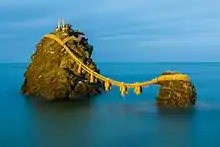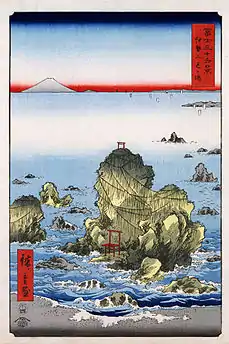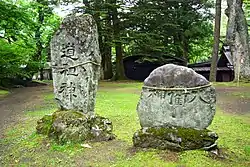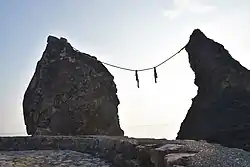Meoto Iwa
Meoto Iwa (夫婦岩), or Married Couple Rocks, are a kind of rock formation seen as religiously significant in Shinto. They are a subtype of Iwakura rock.


According to Shinto, the rocks represent the union of the creator kami, Izanagi and Izanami. The rocks, therefore, celebrate the union in marriage of man and woman.
The most famous pair is the pair at Futami Okitama Shrine in Futami-ura, two rocky stacks off the coast from Ise, Mie, Japan. They are joined by a shimenawa (a heavy rope of rice straw) and are considered sacred by worshippers of the shrine. The shimenawa, composed of five separate strands which each weigh 40 kilograms,[1] must be replaced several times a year in a special ceremony. The larger rock, said to be male, has a small torii at its peak.

At dawn during the summer, the sun appears to rise between the two rocks. Mount Fuji is visible in the distance. At low tide, the rocks are not separated by water.
Okitama Shrine is dedicated to Sarutahiko Ōkami and imperial food goddess Ukanomitama. There are numerous statues of frogs around the shrine. The shrine and the two rocks are near the Grand Shrine of Ise, the most important location of purification in Shinto.
Outline
The couple rocks at Futami Okitama Shrine in Mie Prefecture Ise City have been known for a long time, as depicted by Ukiyo-e artist in the Edo period, and are generally used as a symbol and prayer for "marital bliss and domestic safety", "maritime security and great catch". It is also a symbol and prayer for "marital bliss and domestic safety", "maritime security and a good catch of fish", and is said to be a symbol of Iwakura Shinko in Kojindo, which means a symbolic place or object in Nature, especially megaliths, rocks, and mountains, were considered Shintais and believed to be places where Kamis resided. For this reason, shimenawas and toriis were decorated as proof that a deity resided there (kanzumaru).
It is also an embodiment of the concept of the two sides of the same coin that pervades ancient Shinto and current shintos, such as the idea that this world consists of Utsushi-yo and Tokoyo, and the Seven Lucky Gods of Ebisu and Daikoku, two of the Seven Lucky Gods, are believed to be one, and the counting of chopsticks and footwear as one set or one pair is also said to be unique to Japan.
In the Kojiki, there are many Myths about married couples, from Izanami and Izanagi to Sarutahiko Ōkami and Ame-no-Uzume. It is thought that these became Sai no Kami and Dosojin, and were connected with the belief in a rock formation. This is why Jizos and Dōsojin are often depicted as a couple or as a pair of large and small rocks or stone statues. This kind of belief in married couples has spread throughout the world over time and has become familiar in the form of married couple's bowls, etc. At the same time, it is deeply related to the belief in child-rearing and child-bearing in the framework of family, such as householder and home. The 'Iwana' are deeply related to the belief in child-bearing, child-rearing, and the treasure of children.
These ideas of rock-building belief, Omote-Taiwanai and matrimonial belief (also called matrimonial harmony, which is the basis of ancestral spirit belief) are combined to form the object of enshrinement at the couple's rock.
Oshimenawa
An example of an oshimenawa is Tateishi in Futami Towne, Ise City, Mie Prefecture. The large shimenawa rope connecting Tateishi and Nejiriwa, known as "husband and wife rocks," is believed to be the torii (gateway) to the offshore Kohtama Shrine stone, and is reattached three times a year in December (before the New Year), May, and September.[2] During the shimenawa-renawa-renawa-renawa-renawa-renawa-renawa-renawa ceremony, a woodcarving song is sung, and some people take pieces of the old rope home as a good-luck charm for marital bliss.[3]
Influence
American composer Roger Reynolds took reference to the form of Meoto Iwa in Futami, where he visited in 1966, while composing the first movement "Futami ga Ura" of his second symphony, "Symphony [Myths]" (1990). Divided into 3 sections, the first and the last with "densely stratified texture" represent Izanagi and Izanami rocks respectively, and the middle section represents the space in-between.[4]
National Married Couple Rocks Summit
The National Married Couple Rocks Summit Liaison Council has been formed by 10 tourist spots in Japan that have married couple rocks or rocks for married couples, and is holding the National Married Couple Rocks Summit.
Married Couple Rocks Around Japan




Hokkaido District
- Hokkaido Samani County Samani Town, Oyakoiwa (parent and child rocks)
- Oyakoiwa, a couple of rocks in Uryū County Horokanai Town, Hokkaido
- Meotoiwa, a couple rocks in Kamifurano Town, Hokkaido Sorachi District.
- Meotoiwa (married couple rocks) in Kamikawa County Wassamu Town, Hokkaido
- Fuufu Iwa (Couple Rocks) in Shari-gun Shari Town, Hokkaido
- Meotoiwa (Couple Rocks) in Akkeshi County, Hokkaido Akkeshi Town.
Tohoku District
- Aomori Prefecture Shimokita County Kazamaura Village, Futamiwa
- Meotoiwa in Kitatsugaru District Nakadomari Town, Aomori Prefecture
- Iwate Prefecture Ichinoseki City, Senmaya Town
- Meotoiwa (married couple rocks) in Ninohe City, Iwate Prefecture; see Basenkyo for details *
- Couple rocks in Kuji City, Iwate Prefecture, see Kosode Beach for more information.
- Kesen County Sumita Town, Iwate Prefecture
- Miyagi Prefecture Igu District Marumori-cho
- Fukushima Prefecture Shirakawa City
Kanto Region
Chubu Region
- Niigata Prefecture Joetsu City
- Sado City, Niigata Prefecture
- Hatagoiwa, also known as Noto Futami*, in Shiga Town, Ishikawa Prefecture.
- Fukui Prefecture Fukui City's Meotoiwa (Couple Rocks)
- Meotoiwa, a couple of rocks in Mikatakaminaka County Wakasa Town, Fukui Prefecture
- Nagano Prefecture Nakano City
- Minamisaku-gun, Nanamaki Village, Nagano Prefecture
- Kamiminouchi District Ogawa Village, Nagano Prefecture, Japan
- Gifu Prefecture Nakatsugawa City, Meotoiwa*]
- Shizuoka Prefecture Kamo District Matsuzaki Town
Kinki Region
- Mie Prefecture Ise City, Tateishi (立石) in E, Futami Town. It is often called Meotoiwa (married couple rock) or Myotoiwa. See Futami Okitama Shrine for details. *
- Shima City, Mie Prefecture Shima City, Meotoiwa (married couple's rock) in Tategami, Ago Town.
- Shiga Prefecture Higashi-ohmi City, Meotoiwa (husband and wife rocks) → See Aga Shrine for details.
- Osaka Prefecture Takatsuki City's Meotoiwa (couple rocks).
- Hyōgo Prefecture Takarazuka City
Chugoku Region
- Okayama Prefecture Bizen City
- Meotoiwa, husband and wife rocks in Takahashi City, Okayama Prefecture
- "Meotoiwa" (couple rocks) in Hiroshima Prefecture Etajima City, Hiroshima Prefecture
- Higashi Hiroshima City, Hiroshima Prefecture
- Yamaguchi Prefecture Shimonoseki City, Yamaguchi Prefecture
- Meotoiwa (Couple Rocks) in Shunan City, Yamaguchi Prefecture
Shikoku Region
- Tokushima Prefecture Naruto City, Meotoiwa
- Ehime Prefecture Matsuyama City's Meotoiwa. Also known as Iyo Futami (Iyo Futami, Iyo no Futami). * Kashima Island
- Meotoiwa (Couple Rocks) in Yawatahama City, Ehime Prefecture.
- Meotoiwa (Couple Rocks) in Kita-uwa County Onikita Town, Ehime Prefecture
- Kochi Prefecture Kōnan City's Meotoiwa*.
- Meotoiwa (Couple Rocks) in Muroto City, Kochi Prefecture
- Meotoiwa, a couple rocks in Nagaoka County Otoyo Town, Kochi Prefecture
Kyushu Region
- Fukuoka Prefecture Yame City's Meotoiwa*]
- Meotoiwa*, Futamigaura, Itoshima City, Fukuoka Prefecture
- Meotoiwa (Couple Rocks) in Minami Ward, Fukuoka City, Fukuoka Prefecture
- Meotoishi (couple rocks) in Kasuya County Shingu Town, Fukuoka Prefecture
- Nagasaki Prefecture Nagasaki City, Fuufu Iwa
- Meotoiwa, a couple rocks in Sasebo City, Nagasaki Prefecture
- Oiwa Meiwa* in Saga Takeo City, Saga Prefecture
- Meotoishi, a couple stones in Nishimatsuura-gun Arita Town, Saga Prefecture
- Kumamoto Prefecture Kuma County Asagiri Town, Meotoiwa
- Bungo Futami in Oita Prefecture Saiki City
- Myotoishi, Kunisaki City, Oita Prefecture
- Yin-Yang stones in Kobayashi City, Miyazaki Prefecture
- Kagoshima Prefecture Kumage County Nakatane Town, Meotoiwa
Okinawa Region
- Meotoze in Okinawa Prefecture Naha City
- Mihugaru (Female rock) in Shimajiri-gun Kumejima Town, Okinawa Prefecture
See also
- Futami-ura
- Futami Okitama Shrine
- Kashima Island
- Bungo Futamigaura
- Imoseyama
References
- "Meoto-iwa rocks (Mie Prefecture) - Let's travel around Japan!". Let's travel around Japan. Retrieved 13 March 2021.
- Special Feature: Shimenawa at Ise Jingu Kaikan reverence association
- husband-and-wife-iwa-dai-shimenawa-renawa-renawa-renawa-renawa-shikiji Youtube 2010/12/19
- Summar, Sarah Page (December 2012). Fidget, Sway, and Swerve: Three Works Inspired by Movement from the Intricate Maneuvers Series (PDF) (PhD). University of North Texas.
_20170416.jpg.webp)